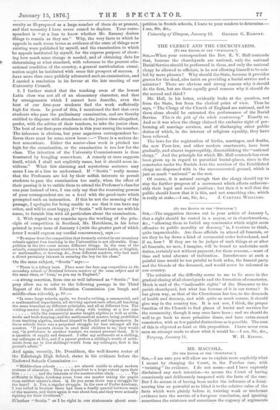THE CLERGY AND THE CHURCHYARDS.
[TO THE EDITOR OF THZ SPECTETOR."]
SIR,—When your correspondent the Rev. E. V. Hall contends that, because the churchyards are national, only the national Burial Service should be performed in them, and only the national clergy be allowed to officiate, is he not allowing himself to be mis- led by mere phrases ? Why should the State, because it provides graves for the dead, also insist on providing a burial service and a minister? There are obvious and strong reasons why it should do the first, but are there equally good reasons why it should do the second and third?
Mr. Hall, in his letter, evidently looks at the question, not from the State, but from the clerical point of view. Thus he says, "The Clergy of the Church of England are national, and to them alone should be entrusted the performance of the Burial Service. This is the pith of the whole controversy." Exactly so. And so it was when the clergy claimed the exclusive right of per- forming all marriage services, and of discharging other public duties of which, in the interest of religious equality, they have been relieved.
The laws for the registration of births, marriages, and deaths, the new Poor-law, and other modern enactments, have been gradually, and almost imperceptibly, disestablishing the "national clergy." And the principle for which Mr. Hall contends has even been given up in regard to parochial burial-places, since in tho cemeteries under the Burials Acts the services of the Established clergy are dispensed with in the unconsecrated ground, which is just as much " national " as the rest.
Of course, it is natural enough that the clergy should try to stay the further progress of a movement which affects unfavour- ably their legal and social position ; but then it is well that the public should know that it is this, and not something else, which
is really at stake.—I am, Sir, &c., J. CARVELL WILLIAMS.


































 Previous page
Previous page